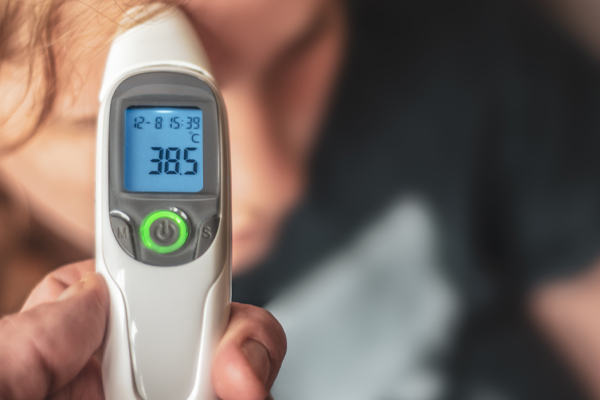
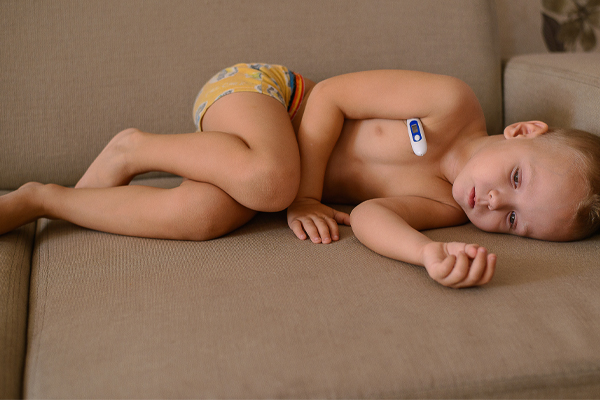
During the COVID-19 pandemic, parents may need to check their children for symptoms, including fever, before they go to school, child care, or sports activities. Feeling your child’s forehead is quick but not very exact. Most modern digital thermometers work fast and are easy to use.
What type of thermometer is best for my child?
It is best to use a digital thermometer to check your child’s temperature. Do NOT use a mercury thermometer. These thin glass devices filled with the silvery metal can break and release toxic levels of mercury fumes. In fact, if you have a mercury thermometer at home, you should remove it.
What is a normal temperature, and what is considered a fever?
A “normal” temperature varies with the child’s age, activity, and time of day. A fever usually is a temperature of 100.4 degrees Fahrenheit (38 degrees Celsius) or higher. This is a sign that the body is fighting an illness. Your child’s temperature, age and other signs of illness will help your doctor recommend treatment that is best for your child.
What are some different types of digital thermometers?
There are different types of digital thermometers that measure temperature at different areas of the body. Rectal (in the anus) temperatures are the most accurate. Forehead temperatures are the next most accurate. Oral and ear temperatures are accurate if done properly. Armpit temperatures are the least accurate, but you can use this method to screen a child of any age.
Call your pediatrician right away if your child:
• is 2 months old or younger with a rectal temperature of 100.4 degrees Fahrenheit or higher, or if fever rises above 104°F (40°C) repeatedly at any age.
• looks very ill, is unusually drowsy, or is very fussy.
• has been in a very hot place, such as an overheated car.
• has other symptoms, such as a stiff neck, severe headache, severe sore throat, severe ear pain, an unexplained rash, or repeated vomiting or diarrhea.
• has immune system problems, such as sickle cell disease or cancer, or is taking steroids. • has had a seizure.
What are some different types of digital thermometers?
There are different types of digital thermometers that measure temperature at different areas of the body. Rectal (in the anus) temperatures are the most accurate. Forehead temperatures are the next most accurate. Oral and ear temperatures are accurate if done properly. Armpit temperatures are the least accurate, but you can use this method to screen a child of any age. Whatever approach is used, follow the cleaning instructions on the package before use.
Here are 3 types of digital thermometers:
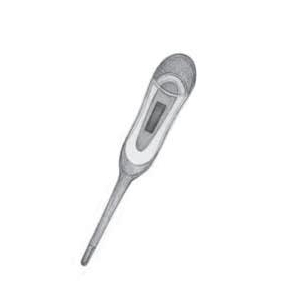
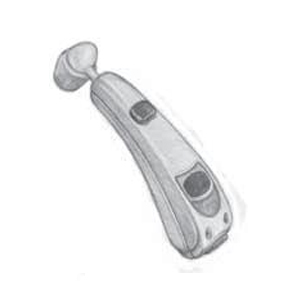
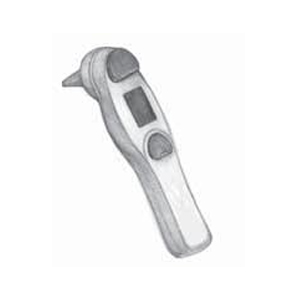
Digital multi-use thermometer
• Measures temperature in child’s bottom (rectal), mouth (oral) or armpit (axillary).
• Oral use is not recommended until a child is age 4 or older.
• Reads body temperature when the sensor located on the tip of the thermometer touches that part of the body.
• It’s important to label the thermometer “oral” or “rectal” so it isn’t used in both places.
Temporal artery
Measures infrared heat waves coming off the blood vessel that runs across the forehead just below the skin.
• Can be used for all ages. • Temperature is taken on the side and front of the forehead, depending on whether it is a non-contact or “no-touch” model. Check the instructions to find out how close to the forehead and other tips before using.
• Non-contact models may help reduce the risk of passing germs.
• Direct sunlight and cold temperatures after being outside may affect reading.
Tympanic
Measures temperature in a child’s ear by reading infrared heat waves from the eardrum.
• Can be used on children age 6 months and older. Not reliable for younger babies, whose ear canals are too narrow.
• It needs to be placed correctly in your child’s ear canal to be accurate (see “Ear temperature,” below).
• Cold temperatures after being outside can affect reading.
How to Use a Digital Thermometer
To get the right thermometer reading, it is important to always follow the instructions that came with the device.
Rectal temperature
Taking a rectal temperature gives the best reading, especially for infants under 3 months of age. Here is how to take a rectal temperature:
Put a small amount of lubricant, such as petroleum jelly, on the end of the thermometer and on your child’s bottom. • Place your child belly down across your lap or on a firm surface. Another way is on the back with the legs pulled up to the chest. Turn the thermometer on and slide it 1/2 inch (for babies less than 6 months old) to 1 inch into the anus. Be gentle. There should not be any resistance. If there is, stop. Hold your child still. Leave the thermometer in place until it beeps. Then remove and check the digital reading.
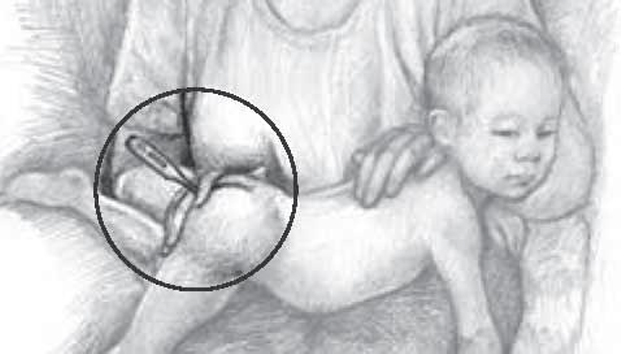
• Thermometers should be disinfected before and after use with disinfecting soap and water or disinfecting alcohol swab.
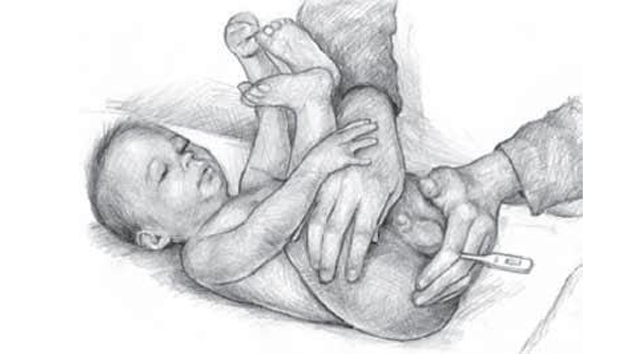
Oral temperature
Once your child is 4 years old, you can take a temperature by mouth. Here is how to take an oral temperature:
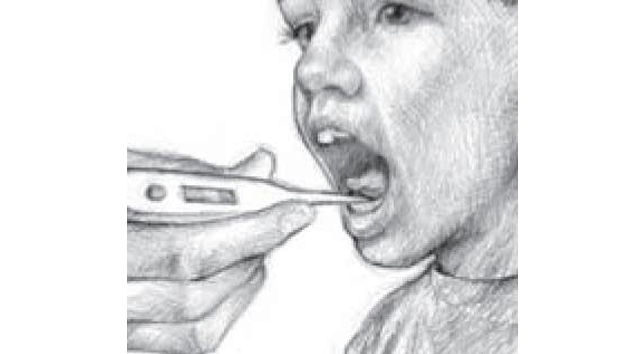
• Turn the thermometer on and place the tip under one side of your child’s tongue toward the back of the mouth. Have your child hold the thermometer with their lips and fingers. Do not use the teeth to keep in place.
• Keep the lips sealed over the thermometer until it beeps. Check the digital reading.
Forehead temperature
Temporal artery (forehead) thermometers can be used on children of any age. Here is how to take a forehead temperature:
• Follow the instructions on the package to know how and where to slide or aim the sensor across the forehead to get the most accurate measurement.
• The sensor measures the heat waves coming off the temporal artery. This blood vessel runs across the forehead just below the skin.
• Read your child’s temperature on the display screen.
Ear temperature
Tympanic (ear) thermometers can be used on children 6 months of age and older, as young infants have narrow ear canals. Here is how to take an ear temperature:
• Follow the instructions on the package.
• A correct temperature depends on pulling the ear back. Pull the ear back and up if the child is over 1 year old. Then aim the tip of the ear probe between the opposite eye and ear.
• Being outdoors on a cold day may cause a low reading. Wait 15 minutes after coming indoors to take the temperature.
Remember
Fever is just one sign of illness, but an important one. Talk with your child’s paediatrician if you have any questions about fever and taking your child’s temperature.

